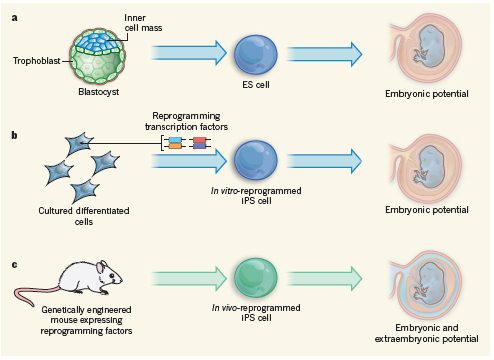Reprogramming in vivo produces teratomas and iPS cells with totipotency features
Reprogramming of adult cells to generate induced pluripotent stem cells (iPS cells) has opened new therapeutic opportunities; however, little is known about the possibility of in vivo reprogramming within tissues. Here we show that transitory induction of the four factors Oct4, Sox2, Klf4 and c-Myc in mice results in teratomas emerging from multiple organs, implying that full reprogramming can occur in vivo. Analyses of the stomach, intestine, pancreas and kidney reveal groups of dedifferentiated cells that express the pluripotency marker NANOG, indicative of in situ reprogramming. By bone marrow transplantation, we demonstrate that haematopoietic cells can also be reprogrammed in vivo.Notably, reprogrammable micepresent circulating iPS cells in the blood and, at the transcriptome level, these in vivo generated iPS cells are closer to embryonic stem cells (ES cells) than standard in vitro generated iPS cells. Moreover, in vivo iPS cells efficiently contribute to the trophectoderm lineage, suggesting that they achieve a more plastic or primitive state than ES cells. Finally, intraperitoneal injection of in vivo iPS cells generates embryo-like structures that express embryonic and extraembryonic markers. We conclude that reprogramming in vivo is feasible and confers totipotency features absent in standard iPS or ES cells. These discoveries could be relevant for future applications of reprogramming in regenerative medicine.
Reprogramming into pluripotency remains an intense field of investigation that is providing many insights about cellular plasticity. Cellular reprogramming has been achieved under carefully controlled in vitro culture conditions, whereas the in vivo tissue microenvironment is, in principle, conducive to cellular differentiation and opposed to reprogramming. However, we took note of remarkable examples in mice in which the normally irreversible state of cellular differentiation has been altered, inducing direct conversions in vivo from one cell type into a different one. Encouraged by these precedents, we have attempted to achieve reprogramming in vivo.

Source : Nature; 2013 Oct 17
